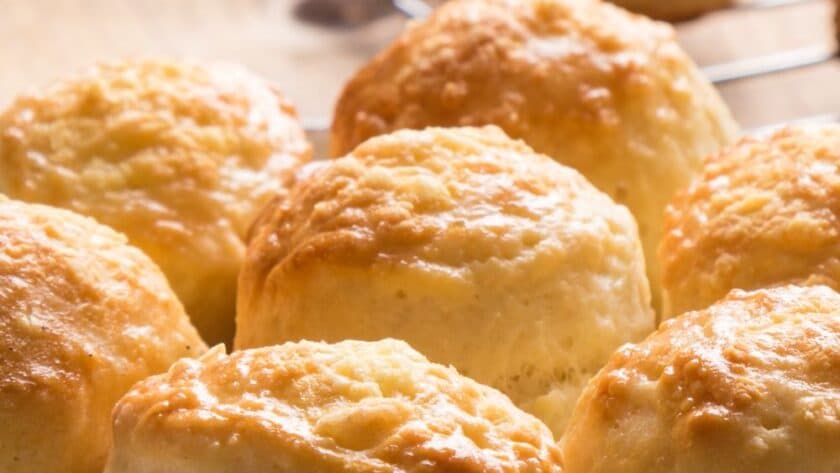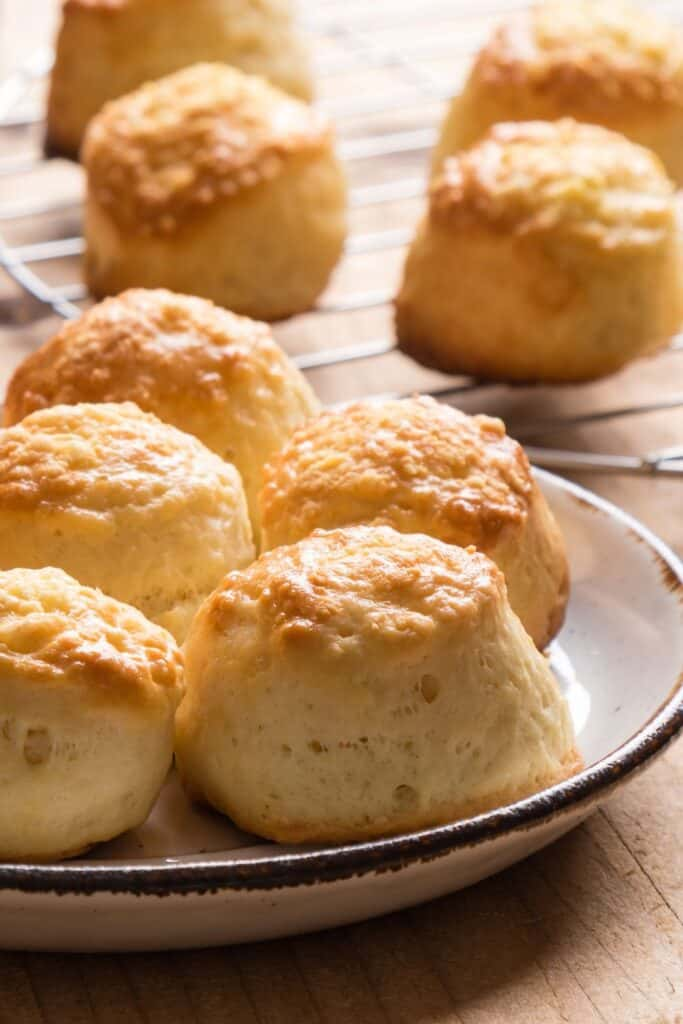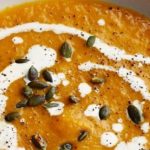Mary Berry’s Devonshire Scones are the perfect blend of light, fluffy, and buttery texture, making them ideal for a traditional English cream tea. These classic scones are quick to make and come together with simple ingredients, making them a great choice for beginners and seasoned bakers alike. Serve them warm with clotted cream and jam for a delightful treat any time of day.
What Are Mary Berry’s Devonshire Scones?
Mary Berry’s Devonshire Scones are classic British scones known for their light, flaky texture and rich buttery flavor. They’re made with self-raising flour, butter, and a hint of sugar, creating a slightly sweet, tender scone that’s perfect for splitting and topping with clotted cream and jam. These scones are traditionally enjoyed as part of an afternoon tea, making them a favorite in the UK.

Why You’ll Love This Recipe
- Quick and Easy: Made with simple pantry ingredients and ready in under 30 minutes.
- Light and Fluffy Texture: A soft crumb that’s perfect for spreading with cream and jam.
- Classic British Flavor: A traditional recipe that’s perfect for tea time.
- Perfect for Gatherings: Impress guests with these easy homemade scones.
- Versatile Serving Options: Serve with clotted cream, jam, or butter.
Ingredients Needed to Make Mary Berry Devonshire Scones
- 450g self-raising flour – Provides a light texture and structure.
- 2 tsp baking powder – Helps the scones rise and stay fluffy.
- 75g cold butter (cubed) – Adds richness and creates flaky layers.
- 50g caster sugar – Adds a hint of sweetness to the scones.
- 2 large eggs – For moisture and structure.
- 225ml milk – Binds the ingredients and adds softness.
- Extra flour (for dusting) – Prevents sticking when shaping the dough.
For Serving
- Clotted cream – A traditional topping for scones.
- Strawberry or raspberry jam – Adds a sweet, fruity touch.
Instructions to Make Mary Berry Devonshire Scones
Step 1: Preheat the Oven and Prepare the Baking Tray
Preheat your oven to 220°C (200°C fan, 425°F). Lightly grease a baking tray or line it with parchment paper to prevent sticking.
Step 2: Combine Dry Ingredients
In a large mixing bowl, sift together the self-raising flour and baking powder. Add the caster sugar and stir to combine.
Step 3: Rub in the Butter
Add the cubed cold butter to the dry ingredients. Using your fingertips or a pastry cutter, rub the butter into the flour until the mixture resembles fine breadcrumbs. Work quickly to avoid warming the butter too much.
Step 4: Add Wet Ingredients
In a separate bowl, beat the eggs lightly and set aside a tablespoon for the egg wash. Add the remaining beaten eggs and milk to the dry ingredients, stirring gently with a spatula until the mixture starts to come together.
Step 5: Form the Dough
Turn the dough onto a lightly floured surface and gently knead just a few times until smooth. Be careful not to overwork the dough, as this can make the scones tough.
Step 6: Cut Out the Scones
Pat the dough to a thickness of about 2-3 cm (¾-1 inch). Using a round cutter, cut out the scones, pressing straight down without twisting to ensure they rise evenly. Gather any remaining dough, pat it out again, and cut additional scones.
Step 7: Brush with Egg Wash and Bake
Place the scones on the prepared baking tray, spacing them slightly apart. Brush the tops with the reserved beaten egg or a little extra milk for a golden finish. Bake in the preheated oven for 12-15 minutes, or until the scones are well-risen and golden brown on top.
Step 8: Cool and Serve
Allow the scones to cool slightly on a wire rack. Serve warm or at room temperature with clotted cream and strawberry or raspberry jam.

What Goes Well with Mary Berry Devonshire Scones
- Clotted Cream and Jam: The traditional pairing for scones, adding richness and sweetness.
- Butter: Simple and delicious, especially when the scones are warm.
- Lemon Curd: A tangy alternative to jam for a fresh twist.
- Whipped Cream: A lighter option for spreading.
- Honey or Maple Syrup: Adds a subtle sweetness and enhances the buttery flavor.
- Fresh Berries: For a fresh, fruity touch.
- English Breakfast Tea: Complements the scones perfectly for a traditional tea-time experience.
Expert Tips for the Best Devonshire Scones
- Use Cold Butter: Cold butter creates flaky layers; work it in quickly to prevent melting.
- Avoid Overmixing: Mix gently to avoid tough scones; only knead lightly until the dough comes together.
- Pat, Don’t Roll: Pat the dough out by hand to retain a light texture.
- Brush with Egg Wash: This adds a beautiful golden finish.
- Cut Straight Down: Avoid twisting the cutter to help the scones rise evenly.
- Serve Freshly Baked: Scones are best enjoyed fresh, warm from the oven.
Easy Variations of Mary Berry Devonshire Scones
- Cheese Scones: Add grated cheese and a pinch of mustard powder for savory scones.
- Fruit Scones: Mix in currants or raisins for a sweet twist.
- Cinnamon and Sugar: Add cinnamon to the dough and sprinkle with sugar before baking.
- Lemon Zest: Add zest to the dough for a hint of citrus.
- Whole-Wheat Flour: Substitute some flour for whole-wheat for added fiber and flavor.
- Glazed Scones: Drizzle with a simple icing glaze for a sweet finish.
Best Practices to Store Mary Berry Devonshire Scones
- Store in an Airtight Container: Keeps them fresh for 1-2 days at room temperature.
- Freeze for Longer Storage: Wrap tightly in plastic wrap and freeze for up to 3 months.
- Reheat in the Oven: Warm in the oven at 180°C (350°F) for a few minutes before serving.
- Avoid Refrigeration: Refrigerating scones can make them dry.
How Can I Make Mary Berry Devonshire Scones Healthier?
- Use Whole-Wheat Flour: Replace some self-raising flour with whole-wheat flour for extra fiber.
- Reduce Sugar: Use less caster sugar or substitute with a natural sweetener.
- Try Greek Yogurt: Swap some butter with Greek yogurt for a lighter texture.
- Add Fresh Fruit: Add fresh berries for a natural sweetness and fiber boost.
- Use Almond Milk: Replace regular milk with almond or another plant-based milk.
Nutrition Value (Per Serving)
- Calories: 220 kcal
- Fat: 10g
- Carbohydrates: 28g
- Protein: 5g
- Sugar: 5g
FAQs
What Is the Secret to Making Mary Berry’s Devonshire Scones Light and Fluffy?
The key to light and fluffy scones is using cold butter and handling the dough gently. Rub in the cold butter until the mixture resembles fine breadcrumbs, and avoid overmixing when adding the liquid. Gently pat the dough rather than rolling it, and press the cutter straight down without twisting for an even rise.
Can I Freeze Mary Berry’s Devonshire Scones?
Yes, you can freeze Devonshire scones. Once baked and cooled, wrap them individually in plastic wrap and place them in an airtight container or freezer bag. Freeze for up to 3 months. When ready to enjoy, reheat the scones in the oven at 180°C (350°F) for a few minutes until warm.
Should You Rest the Dough for Scones?
Resting scone dough isn’t necessary, but letting it rest in the refrigerator for about 15 minutes can help the scones hold their shape and rise more evenly. It also allows the butter to firm up, resulting in a flakier texture.
Why Did My Scones Not Rise Properly?
If your scones didn’t rise well, it could be due to overmixing the dough, which makes it tough and dense. Also, make sure your baking powder is fresh for maximum lift, and preheat the oven fully before baking. Using a straight-down motion when cutting the scones, rather than twisting, will also help them rise evenly.
Final Words
Mary Berry’s Devonshire Scones are the perfect addition to any tea-time spread, with their light and fluffy texture and classic buttery flavor.
This easy-to-follow recipe yields scones that are golden and delicious, whether you’re serving them fresh from the oven or saving them for later. Pair them with clotted cream, jam, and a cup of tea to enjoy a truly traditional British treat!
Other Popular Recipes
- Mary Berry Honey Mustard Chicken
- Mary Berry Apricot Tart
- James Martin Chocolate Cream Pie
- Mary Berry Apricot and Chestnut Stuffing

Mary Berry Devonshire Scones
- Prep Time: 15
- Cook Time: 15
- Total Time: 30 minutes
- Yield: 12 1x
- Category: Breakfast
- Method: Baking
- Cuisine: British
Description
Mary Berry’s Devonshire Scones are classic British scones known for their light, flaky texture and rich buttery flavor. They’re made with self-raising flour, butter, and a hint of sugar, creating a slightly sweet, tender scone that’s perfect for splitting and topping with clotted cream and jam. These scones are traditionally enjoyed as part of an afternoon tea, making them a favorite in the UK.
Ingredients
- 450g self-raising flour – Provides a light texture and structure.
- 2 tsp baking powder – Helps the scones rise and stay fluffy.
- 75g cold butter (cubed) – Adds richness and creates flaky layers.
- 50g caster sugar – Adds a hint of sweetness to the scones.
- 2 large eggs – For moisture and structure.
- 225ml milk – Binds the ingredients and adds softness.
- Extra flour (for dusting) – Prevents sticking when shaping the dough.
For Serving
- Clotted cream – A traditional topping for scones.
- Strawberry or raspberry jam – Adds a sweet, fruity touch.
Instructions
Step 1: Preheat the Oven and Prepare Baking Tray
Preheat your oven to 220°C (200°C fan, 425°F). Lightly grease a baking tray or line it with parchment paper to prevent sticking.
Step 2: Combine Dry Ingredients
In a large mixing bowl, sift together the self-raising flour and baking powder. Add the caster sugar and stir to combine.
Step 3: Rub in the Butter
Add the cubed cold butter to the dry ingredients. Using your fingertips or a pastry cutter, rub the butter into the flour until the mixture resembles fine breadcrumbs. Work quickly to avoid warming the butter too much.
Step 4: Add Wet Ingredients
In a separate bowl, beat the eggs lightly and set aside a tablespoon for the egg wash. Add the remaining beaten eggs and milk to the dry ingredients, stirring gently with a spatula until the mixture starts to come together.
Step 5: Form the Dough
Turn the dough onto a lightly floured surface and gently knead just a few times until smooth. Be careful not to overwork the dough, as this can make the scones tough.
Step 6: Cut Out the Scones
Pat the dough to a thickness of about 2-3 cm (¾-1 inch). Using a round cutter, cut out the scones, pressing straight down without twisting to ensure they rise evenly. Gather any remaining dough, pat it out again, and cut additional scones.
Step 7: Brush with Egg Wash and Bake
Place the scones on the prepared baking tray, spacing them slightly apart. Brush the tops with the reserved beaten egg or a little extra milk for a golden finish. Bake in the preheated oven for 12-15 minutes, or until the scones are well-risen and golden brown on top.
Step 8: Cool and Serve
Allow the scones to cool slightly on a wire rack. Serve warm or at room temperature with clotted cream and strawberry or raspberry jam.



